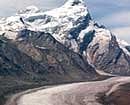

"We are talking to the Chinese about monitoring the Himalayan glaciers," Ramesh told the Financial Times.
However, he said India would not allow Chinese scientists "to climb all over India's glaciers" but wanted a collaborative research programme.
He said as part of a scientific investigation into the health of what are called the 'Water Towers of Asia', academic research bodies on both sides of the mountain range would share information.
He said New Delhi is open to dialogue on water resources with Beijing, adding the two countries shared the concerns.
Ramesh is visiting China this month to strike a deal with Beijing ahead of the Copenhagen talks on climate change in December.
He said India and China could be a "countervailing power" in resisting legally binding caps on greenhouse emissions that threaten to slow the progress of the two fastest growing economies.
The Himalayan region and the Tibet plateau are strategically sensitive for the two countries.
Seven of the world's greatest rivers, including the Ganges and the Yangtze, are fed by glaciers, and supply water to about 40 per cent of the world's population.
The Financial Times' report said the Indian government has disputed the "doomsday predictions" linking melting of Himalayan glaciers to climate change, saying there is no evidence to support that glaciers will disappear within 40 years.
"It's a highly emotive issue but one has to be a little careful before we write the epitaph of the Himalayan glaciers," Ramesh said.
Indian government has requested that the Indian Space Research Organisation (ISRO) and the department of science and technology undertake extensive glacial surveys across the eastern and western Himalayas to assess their condition.